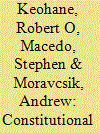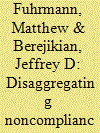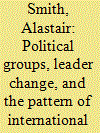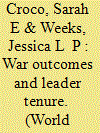| Srl | Item |
| 1 |
ID:
106255


|
|
|
|
|
| Publication |
2011.
|
| Summary/Abstract |
According to our constitutional conception, modern democracy is multidimensional: it incorporates the values of faction control, minority rights protection, and informed deliberation, as well as political accountability. The impact of multilateral organizations (MLOs) on democracy is often not straightforward: it requires careful analysis of how particular MLOs interact with preexisting domestic political institutions within specific issue-areas. Thus we reject the conventional wisdom that MLOs are necessarily democracy-degrading simply because they are not directly participatory. Gartzke and Naoi's critique misstates our views on some fundamental issues. We clarify our analyses of the multidimensional nature of constitutional democracy; the relationship between democracy and multilateralism; the Madisonian distinction between interest groups that support the general interest and those that do not; and our understanding of the current state of research. We suggest possibilities for further elaborating our argument, theoretically and empirically.
|
|
|
|
|
|
|
|
|
|
|
|
|
|
|
|
| 2 |
ID:
113751


|
|
|
|
|
| Publication |
2012.
|
| Summary/Abstract |
Why do states make disingenuous treaty commitments? Under what conditions will countries refrain from entering cooperative agreements with which they do not expect to comply? This article addresses these questions by analyzing how states that are pursuing nuclear weapons treat the nuclear Nonproliferation Treaty (NPT). The authors develop a distinction between two types of noncooperative behavior. The first is cheating while part of the NPT (predation) and the second is pursuing nuclear weapons outside of the treaty (abstention). The authors' argument is that democratic proliferators are more likely to abstain because executives in democracies are domestically constrained to a greater degree than authoritarian leaders. Statistical tests in a sample of all countries with active nuclear weapons programs from 1968 to 2004 provide evidence in favor of our argument. Controlling for confounding variables and the factors that motivate states to pursue nuclear weapons, the results show that states with greater constraints on executive authority are less likely to choose predation. Yet, electoral mandates do not appear to dissuade governments from making disingenuous treaty commitments. These findings have important implications for nuclear proliferation, the credibility of international commitments, and efforts to link domestic political institutions with international outcomes.
|
|
|
|
|
|
|
|
|
|
|
|
|
|
|
|
| 3 |
ID:
092047


|
|
|
|
|
| Publication |
2009.
|
| Summary/Abstract |
Nations are politically heterogeneous and which group is in political ascendency shapes the nature of interstate cooperation through two mechanisms. First, groups differ in the benefits they receive from cooperation. This affects which groups can commit to cooperate. Second, a nation may selectively withhold cooperation from one group to influence the domestic political competition between groups in another nation. By integrating political competition between leaders of different groups under different institutional rules into a prisoner's dilemma model of international cooperation, the theory generates hypotheses relating leader turnover, group membership, and patterns of cooperation.
|
|
|
|
|
|
|
|
|
|
|
|
|
|
|
|
| 4 |
ID:
149516


|
|
|
|
|
| Summary/Abstract |
A growing body of literature argues that war outcomes affect leaders’ tenure in office. But disagreement persists over how domestic political institutions translate performance in war into leader accountability. Some scholars argue that the tenure of democratic leaders is most sensitive to war outcomes, while others posit that autocratic leaders are more likely to be punished or rewarded for the outcomes of conflicts. The authors argue that existing research fails to take into account two important factors: whether the leader is viewed as culpable for the country's entry into the conflict, and whether the country features domestic institutions that make the leader vulnerable to removal from office, which varies greatly across nondemocracies. After taking leaders’ culpability and vulnerability into account, the authors show that the tenures of culpable, democratic leaders and culpable, vulnerable, nondemocratic leaders are sensitive to war outcomes. By contrast, the tenures of nondemocratic leaders who are less vulnerable to removal are not sensitive to war outcomes, regardless of their culpability.
|
|
|
|
|
|
|
|
|
|
|
|
|
|
|
|